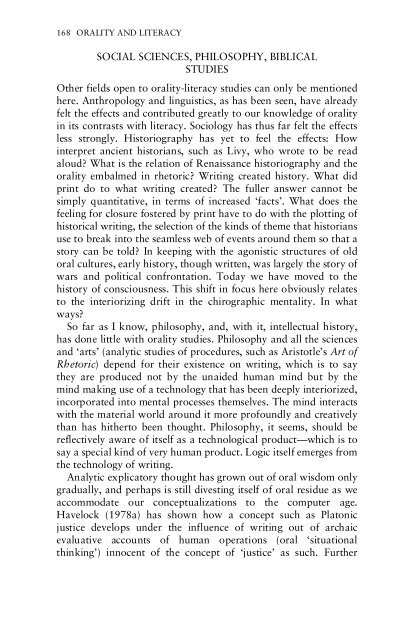Orality and Literacy: The Technologizing of the Word - Monoskop
Orality and Literacy: The Technologizing of the Word - Monoskop
Orality and Literacy: The Technologizing of the Word - Monoskop
Create successful ePaper yourself
Turn your PDF publications into a flip-book with our unique Google optimized e-Paper software.
168 ORALITY AND LITERACY<br />
SOCIAL SCIENCES, PHILOSOPHY, BIBLICAL<br />
STUDIES<br />
O<strong>the</strong>r fields open to orality-literacy studies can only be mentioned<br />
here. Anthropology <strong>and</strong> linguistics, as has been seen, have already<br />
felt <strong>the</strong> effects <strong>and</strong> contributed greatly to our knowledge <strong>of</strong> orality<br />
in its contrasts with literacy. Sociology has thus far felt <strong>the</strong> effects<br />
less strongly. Historiography has yet to feel <strong>the</strong> effects: How<br />
interpret ancient historians, such as Livy, who wrote to be read<br />
aloud? What is <strong>the</strong> relation <strong>of</strong> Renaissance historiography <strong>and</strong> <strong>the</strong><br />
orality embalmed in rhetoric? Writing created history. What did<br />
print do to what writing created? <strong>The</strong> fuller answer cannot be<br />
simply quantitative, in terms <strong>of</strong> increased ‘facts’. What does <strong>the</strong><br />
feeling for closure fostered by print have to do with <strong>the</strong> plotting <strong>of</strong><br />
historical writing, <strong>the</strong> selection <strong>of</strong> <strong>the</strong> kinds <strong>of</strong> <strong>the</strong>me that historians<br />
use to break into <strong>the</strong> seamless web <strong>of</strong> events around <strong>the</strong>m so that a<br />
story can be told? In keeping with <strong>the</strong> agonistic structures <strong>of</strong> old<br />
oral cultures, early history, though written, was largely <strong>the</strong> story <strong>of</strong><br />
wars <strong>and</strong> political confrontation. Today we have moved to <strong>the</strong><br />
history <strong>of</strong> consciousness. This shift in focus here obviously relates<br />
to <strong>the</strong> interiorizing drift in <strong>the</strong> chirographic mentality. In what<br />
ways?<br />
So far as I know, philosophy, <strong>and</strong>, with it, intellectual history,<br />
has done little with orality studies. Philosophy <strong>and</strong> all <strong>the</strong> sciences<br />
<strong>and</strong> ‘arts’ (analytic studies <strong>of</strong> procedures, such as Aristotle’s Art <strong>of</strong><br />
Rhetoric) depend for <strong>the</strong>ir existence on writing, which is to say<br />
<strong>the</strong>y are produced not by <strong>the</strong> unaided human mind but by <strong>the</strong><br />
mind making use <strong>of</strong> a technology that has been deeply interiorized,<br />
incorporated into mental processes <strong>the</strong>mselves. <strong>The</strong> mind interacts<br />
with <strong>the</strong> material world around it more pr<strong>of</strong>oundly <strong>and</strong> creatively<br />
than has hi<strong>the</strong>rto been thought. Philosophy, it seems, should be<br />
reflectively aware <strong>of</strong> itself as a technological product—which is to<br />
say a special kind <strong>of</strong> very human product. Logic itself emerges from<br />
<strong>the</strong> technology <strong>of</strong> writing.<br />
Analytic explicatory thought has grown out <strong>of</strong> oral wisdom only<br />
gradually, <strong>and</strong> perhaps is still divesting itself <strong>of</strong> oral residue as we<br />
accommodate our conceptualizations to <strong>the</strong> computer age.<br />
Havelock (1978a) has shown how a concept such as Platonic<br />
justice develops under <strong>the</strong> influence <strong>of</strong> writing out <strong>of</strong> archaic<br />
evaluative accounts <strong>of</strong> human operations (oral ‘situational<br />
thinking’) innocent <strong>of</strong> <strong>the</strong> concept <strong>of</strong> ‘justice’ as such. Fur<strong>the</strong>r

















